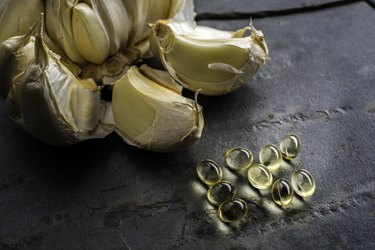
For as long as people have known that high blood cholesterol is a problem for heart health, they have sought out natural remedies for lowering it. One in particular that has spurred interest for decades is garlic, available in supplements such as Garlique. But the research on garlic has been mixed.
Read more: What Are the Side Effects of Garlic Tablets?
Video of the Day
Video of the Day
The Case for Garlic
Garlic, including supplements, has been studied for so long and so extensively that the results have been all over the board. The Mayo Clinic notes that, early on, some studies showed that garlic might be helpful in lowering blood cholesterol.
A review article published in the journal Nutrition Research and Practice in December 2014 noted that the intake of garlic powder in several studies was associated with reduced cardiovascular disease risk factors, including lower total cholesterol, lower LDL cholesterol and reduced blood pressure.
The authors of this particular review article noted that inconsistencies in the results from other studies on garlic may be attributable to the variations in the manufacturing processes of garlic supplements.
"Garlic is an excellent herb to decrease blood pressure and high lipids," says Patrick Fratellone, MD, an integrative cardiologist in New York City. "Garlic is an excellent antioxidant, as well as an antibacterial and antifungal herb. There are many studies supporting the use of garlic for heart disease prevention. I usually combine garlic with globe artichoke to lower total cholesterol and low density lipoprotein (LDL), or bad cholesterol."
The Case Against Garlic
While some studies and experts have advocated for garlic through the years, that thinking is changing in some scientific circles. The Mayo Clinic notes that recent research on garlic and cholesterol has shown no evidence that garlic or garlic supplements have any effect on the blood lipid.
An August 2015 article from the Center for Science in the Public Interest examined the results of a study of 192 adults with high LDL cholesterol. The study participants were divided to receive raw garlic, two separate garlic supplements or a placebo in roughly equal numbers.
At the conclusion of the six-month study, all of the garlic takers in the study (both pills and raw garlic) had roughly the same numbers of LDL, HDL and triglycerides as those who took the placebo. Clearly, at least in this instance, garlic supplements had little effect on cholesterol levels.
"I would say that there is probably no evidence that Garlique is beneficial," says Kunal Karmali, MD, a cardiologist with Northwestern Medicine in Chicago, Illinois. "When I recommend medicines for patients, they are ones that have been studied in rigorous, well-done scientific trials and have demonstrated a benefit time and time again. Supplements and multivitamins have not been shown to be beneficial in impacting cholesterol levels. They're oftentimes untested, and even when they are tested, they are not shown to be beneficial."
The Bottom Line on Garlic
Considering the conflicting evidence, what's the advice for adding garlic or garlic supplements to your daily regimen? If you enjoy garlic, many experts recommend focusing on eating fresh garlic with your meals, rather than garlic supplements.
"Personally, I would recommend consuming garlic in more of my meals rather than taking a pill," says Melissa Rifkin, RD, a bariatric dietitian at Montefiore Medical Center in New York, City.
"And from a cost perspective, it's likely more affordable. Fish and garlic have synergistic properties, which means when the two are paired, the cholesterol-reducing properties in both the fish oils and garlic are known to reduce your risk of heart disease, reduce inflammation and lower cholesterol, triglycerides and blood pressure. Together, they have more power to improve blood chemistry," explains Rifkin.
- Mayo Clinic: "Cholesterol-Lowering Supplements May Be Helpful"
- Nutrition Research and Practice: "Garlic Powder Intake and Cardiovascular Risk Factors: A Meta-Analysis of Randomized Controlled Clinical Trials"
- Patrick Fratellone, MD, integrative cardiologist, New York City
- Center for the Science in the Public Interest: "The Truth About Your Garlic Supplement”
- Kunal Karmali, MD, cardiologist, Northwestern Medicine, Chicago, Illinois
- Melissa Rifkin, RD, bariatric dietitian, Montefiore Medical Center, New York City
Is this an emergency? If you are experiencing serious medical symptoms, please see the National Library of Medicine’s list of signs you need emergency medical attention or call 911.